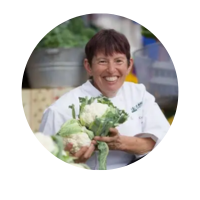Joan Gussow
Joan Dye Gussow is a woman of many parts – writer, nutritionist, food policy expert, gardener, and educator. The California-born academic has undoubtedly made her mark in the food industry, writing books and articles on the subject of sustainable agriculture. She is the first Mary Swartz Rose Professor emerita and has served in different capacities in both private and government organizations.
Early Career
Gussow is a graduate of Pomona College, bagging a BA degree in 1950. Subsequently, she moved to New York City, got married, and became a mom. Her thirst for knowledge remained unquenched, culminating in her earning an M.Ed and an Ed. D. in Nutrition Education from Columbia’s Teachers College in 1969. From there on, she continued to wax stronger. She became the chairperson of the nutrition department at Colombia’s Teacher College. In this role, she created the course now known as Nutritional Ecology.
Impact
We can simply sum up Joan Gussow’s impact in one sentence: “She is a teacher of teachers.” Her works have greatly influenced many modern-day food policy thinkers and nutritionists. One of the earliest instances of the profoundness of her impact is the 1971 testimony she gave in front of a congressional committee about the poor quality of foods being advertised to kids on TV. Her testimony was subsequently published in the Journal of Nutrition Education. Gussow isn’t simply an intellectual giant; she is more than willing to go above and beyond to make her points. Gussow’s successor as chair of the nutrition department said, “I think she actually likes the role of goading and challenging the profession.” As a writer, Joan Gussow has several publications to her name. The most notable of them is perhaps the 1978 book, The Feeding Web: Issues in Nutritional Ecology, which examines the environmental risks of a globalizing food system. The book remains a classic as it anticipated the current interest in relocalizing the food supply. Gussow’s other books include The Nutrition Debate, Chicken Little, Tomato Sauce and Agriculture, and This Organic Life: Confessions of a Suburban Homesteader.
Influence and Recognition
Being a teacher of teachers, Gussow’s works have influenced other notable nutritionists, including Marion Nestle, Barbara Kingsolver, and Michael Pollan. During Joan Gussow’s time on the National Organic Standards Board, she helped shape the regulations that determine the quality of foods the United States Department of Agriculture certifies as organic. If you’re eating any USDA organic-certified food today, you have Gussow to thank for her efforts. She is the recipient of the 2017 James Beard Leadership Award in recognition of her pioneering advocacy of sustainable, healthy food production and for her work as an educator and food policy expert. Gustow also received the Helen Denning Ullrich Award of Excellence in Nutrition Education from the Society for Nutrition Education and Behavior (SNEB) in 2017.
Legacy and Continuing Influence
The New York Times describes Gussow as “the matriarch of the eat-locally think-globally food movement.” Such is the enormity of her impact. She is a trailblazer in the field of nutrition and nutrition education. She introduced a ”social ecological” model to nutrition education, one that has now become a widely accepted framework globally.
Alice Waters
 While sustainability may be a new buzzword for many, it is a life-long commitment for visionaries like Alice Waters. Born on April 28, 1944, Alice Waters is an American chef, restaurateur, and food activist renowned for her pioneering efforts in the sustainable food movement. As the founder of the iconic Chez Panisse restaurant in Berkeley, California, in 1971, Waters has been a champion of farm-to-table dining long before it became a global trend. Her commitment to organic, locally sourced ingredients has transformed American cuisine and inspired a revolution in how we think about food and agriculture.
While sustainability may be a new buzzword for many, it is a life-long commitment for visionaries like Alice Waters. Born on April 28, 1944, Alice Waters is an American chef, restaurateur, and food activist renowned for her pioneering efforts in the sustainable food movement. As the founder of the iconic Chez Panisse restaurant in Berkeley, California, in 1971, Waters has been a champion of farm-to-table dining long before it became a global trend. Her commitment to organic, locally sourced ingredients has transformed American cuisine and inspired a revolution in how we think about food and agriculture.
Early Beginnings and the Birth of Chez Panisse
Alice Water’s experience of the French market culture inspired her to open the Chez Panisse in 1971. She wanted to recreate the connection between food and community she experienced during her stay in France. Chez Panisse was among the first restaurants to introduce the concept of using fresh, local ingredients to create dishes that change with the seasons. This approach was new at the time and laid the foundation for the farm-to-table movement. Waters’ insistence on organic, locally sourced produce transformed the restaurant industry and significantly impacted local farming practices.
The Philosophy of Clean Food
Alice champions the use of organic ingredients, driven by her belief in their benefits for both human health and the planet. Her commitment goes beyond taste, advocating for organics as a superior, sustainable choice. This philosophy has guided her activism and efforts to reform the food system. She founded the Edible Schoolyard Project in 1995. Through this program, Waters advocates for integrating food education into school curriculums. The program started in Berkeley but has now been replicated in schools around the world to teach children the importance of nutrition and the value of sustainable food practices.
Advocacy and Influence
Waters is a vocal advocate for policy changes that support sustainable agriculture and access to healthy food for everyone. Her lobbying efforts have contributed to the increased visibility of organic farming and the slow food movement, which emphasizes the importance of knowing where food comes from and how it’s made. Waters has also been a significant figure in discussions about food security and climate change, using her platform to highlight the critical role that food systems play in both issues.
Awards and Recognition
Alice Waters’ contributions to the food industry and her environmental activism have earned her numerous awards and honors. These include the National Humanities Medal, awarded in 2014, and being named one of Time magazine’s “100 Most Influential People” in 2014. In 1992, she became the first woman to win the James Beard Award for Outstanding Chef.
Legacy and Continuing Impact
The widespread adoption of farm-to-table practices and the growing emphasis on organic and locally sourced ingredients are evidence of Waters’ influence. Her vision for a food system that supports people and the planet inspires new generations of chefs, farmers, and food activists. Through her innovative approach to cooking, relentless advocacy for sustainable agriculture, and dedication to education, Alice Waters has indelibly shaped the food industry. Her work exemplifies how passion and principles can lead to profound societal change, making her a true pioneer in the movement toward a more ethical and sustainable food future.
Ann Cooper
 Our next featured personality is a woman who has come to be known as the “Renegade Lunch Lady” — Ann Cooper. Ann Cooper is a chef, educator, public speaker, and an advocate for healthy food for children. Her career as a chef has spanned over four decades, serving in school food programs for more than 20 years.
Our next featured personality is a woman who has come to be known as the “Renegade Lunch Lady” — Ann Cooper. Ann Cooper is a chef, educator, public speaker, and an advocate for healthy food for children. Her career as a chef has spanned over four decades, serving in school food programs for more than 20 years.
Cooper has dedicated her time and resources to advocate for school food reform as an indispensable way to improve childhood nutrition. She previously served as the director of nutrition services for the Boulder Valley School District. Through her foundation, Cooper provides grants to help schools create healthier food for kids by promoting whole-ingredient, scratch-cooking in schools.
Early Career
Ann Cooper’s early struggles with dyslexia, ADD, and ADHD made traditional learning environments challenging for her, setting her apart from her peers in terms of educational needs and experiences. However, this changed when she discovered her passion for food, which she credits as not just a career but a lifesaving anchor. This newfound interest gave her a sense of belonging and purpose, transforming her relationship with learning and self-expression. Food became the medium through which she could channel her creativity, energy, and focus, leading to a successful and influential career in the culinary world.
A graduate of the Culinary Institute of America, Ann’s distinguished career is quite enviable. Her career as a chef started in 1973. She has previously had stints with Holland America Cruises, Radisson Hotels, and Telluride Ski Resort. Subsequently, she served as Executive Chef at the renowned Putney Inn in Vermont.
Impact
Ann Cooper believes that there is a symbiotic relationship between a healthy planet, healthy food, and healthy kids. She believes if we fail to do this, we could become extinct as we’re feeding our children to death. This is why she has championed the need to fundamentally reform school food programs to ensure that every child has access to fresh, healthy food.
In 2009, Ann founded the Chef Ann Foundation, focusing on promoting whole-ingredient, scratch-cooking in schools to ensure that children have access to the healthiest and tastiest meals, highlighting her commitment to improving nutrition and food education in schools. This foundation has significantly impacted school food reform, illustrating Cooper’s dedication to a healthier future for children.
Influence and Recognition
An accomplished author, Ann has authored four books: Lunch Lessons: Changing the Way We Feed Our Children (2006), In Mother’s Kitchen: Celebrated Women Chefs Share Beloved Family Recipes (2005), Bitter Harvest: A Chef’s Perspective on the Hidden Dangers in the Foods We Eat and What You Can do About It (2000) and A Woman’s Place is in the Kitchen: The Evolution of Women Chefs (1998).
Previously holding the presidency of both The American Culinary Federation of Central Vermont and Women Chefs and Restaurateurs, Ann Cooper has also contributed her expertise as a board member for the latter. Her appointment by Congress to the U.S. Department of Agriculture’s National Organic Standards Board and her role on the Executive Committee of Chefs Collaborative underscore her commitment to promoting the importance of nutritious, locally sourced, organic, and seasonal produce.
She is a recipient of an honorary doctorate from SUNY Cobleskill. Her efforts in advocating for sustainable food systems have earned her recognition from the National Resources Defense Council and the International Association of Culinary Professionals, which honored her as their Humanitarian of the Year in 2012. Food Service Director Magazine listed her among its “Influential 20,” while Greatist.com hailed her as one of the top 15 Health Crusaders in the Food Industry.
Legacy and Continuing Influence
Chef Ann Cooper’s legacy and continuing influence in school nutrition and food sustainability are profound and multifaceted. Her journey from a celebrated chef to a pioneering advocate for school food reform is nothing short of inspirational. Cooper initiated the School Food Institute in 2017, offering online education to school food service workers and advocates. This platform provides comprehensive training on various aspects of school food operations, empowering participants with the knowledge and skills needed to transition to scratch-cooking and embrace fresh ingredients.
With over three million children reached through the Chef Ann Foundation and over 14,000 schools empowered, Chef Ann’s impact on school food reform is indelible. “Catching them young and feeding them right” encapsulates Chef Ann’s vision of integrating nutrition education with practical, healthy eating habits from an early age.
Jessica Fanzo

Jessica Fanzo is currently a nutritionist and researcher. She serves as a Professor of Climate and the Director of the Food for Humanity Initiative at the Columbia Climate School. Her academic journey previously included a tenure as an assistant professor in the Institute of Human Nutrition and the Department of Pediatrics at Columbia University. Fanzo’s professional path has also led her to engage deeply with rural communities in sub-Saharan Africa.
Early Career
Born into an Italian-American family, Fanzo bagged her Bachelor of Science degree, Master’s degree, and PhD from the University of Arizona. She had always wanted a career as a nutritionist, so she opted to study agriculture for her undergraduate degree to understand how we grow and process food. Her subsequent degrees were in the field of nutrition. In addition, she completed a Stephen I. Morse postdoctoral fellowship in Immunology at Columbia University.
Jessica Fanzo’s work cuts across research into food systems and examines how agriculture, health, and environmental concerns intersect, particularly in countries affected by climate change and resource scarcity. With two decades of experience in regions such as sub-Saharan Africa, South Asia, and East Asia, her research delves into the diversity and quality of diets, their nutritional and health implications, environmental sustainability, and strategies for climate adaptation.
Impact
Beyond her institutional roles, she has been a key player in collaborative global efforts. Her leadership in the Food Systems Economic Commission, her insights for the Global Panel of Agriculture and Food Systems for Nutrition’s Foresight 2.0 report, her contributions to the Lancet Commission on Anaemia, and her strategic roles in the EAT-Lancet Commissions demonstrate her commitment to improving global nutrition and food systems. As the Co-Chair of the Global Nutrition Report and Team Leader for the UN High-Level Panel of Experts on Food Systems and Nutrition, she has been at the forefront of transformative initiatives.
Currently, she leads the pioneering Food Systems Dashboard and the Food Systems Countdown to 2030 Initiative in partnership with the Global Alliance of Improved Nutrition. Her body of work and contributions are a testament to her dedication to creating a healthier, more sustainable world for future generations.
Influence and Recognition
In recognition of her contributions, Fanzo was honored with the inaugural Sustainable Diets Prize from the Carasso Foundation in 2012. She was awarded the prize in recognition of her significant research on sustainable food practices and their impact on long-term human health.
Legacy and Continuing Influence
Jessica’s influence is reflected in her extensive body of work in scientific literature, including over 150 peer-reviewed articles. Her editorial contributions include six edited books and more than 30 book chapters. She has also authored more than 50 reports, manuals, and guidelines.
In 2021, Jessica authored Can Fixing Dinner Fix the Planet? published by Johns Hopkins University Press. She also co-wrote Global Food Systems, Diets, and Nutrition: Linking Science, Economics, and Policy, published by Palgrave Macmillan. The book examines the connections between science, economics, and policy in global food systems.

Karen Washington
Farming in urban centers isn’t something you see too often. However, through the works of individuals like Karen Washington, urban farming and gardening are becoming a growing movement that transforms empty lots and unused spaces into lush, productive gardens in New York. Karen Washington is a champion of equitable food systems in urban communities — a path she’s been on since the 1980s and doesn’t seem to be relenting anytime soon.
Early Career
Born in New York City in 1956, Karen attended Hunter College, City University of New York (CUNY), where she bagged a bachelor’s of applied science with honors in physical therapy in 1978. Subsequently, she received a master’s degree in occupational biomechanics and ergonomics from New York University in 1981.
She worked as a physical therapist and started her urban farming activism in the late 80s, collaborating with a neighbor to turn an empty plot of land into what they affectionately called the Garden of Happiness. The garden marked the beginning of her community gardening career.
Impact
Karen Washington’s mission is simple – to get fresh, healthy food into the hands of those who can’t afford it. To achieve this, she joined forces with Bronx Green-Up to secure empty lots across the Bronx area and turn them into lush green gardens and urban farms. Since then, the program has grown in leaps and bounds, currently working with over 200 such green spaces and managing several farm hubs that distribute fresh produce to the community at affordable prices.
She has been at the forefront of garden protection and preservation and has facilitated various projects aimed at promoting gardening and healthy food in urban centers. In 2010, she co-founded Black Urban Growers (BUGS), an organization that supports black growers in urban and rural areas. She co-founded the La Familia Verde Garden Coalition, through which she helped launch a City Farms Market that brings fresh vegetables to the Bronx community.
Influence and Recognition
Karen is a longtime member and former board president of the Northwest Bronx Community and Clergy Coalition. In 2012, she was voted among the 100 most influential African Americans in the United States. In 2014, she was the recipient of the James Beard Leadership Award. In 2023, the James Beard Foundation recognized her again. This time, being awarded the James Beard Award for Humanitarian of the Year. She’s also the recipient of GreenThumb’s Lifetime Achievement Award in 2021.
Legacy and Continuing Influence
After retiring from her physical therapy career in 2014, Karen Washington founded the Rise and Root Farm, where she supports the local community through farming. Her career as a physical therapist and her decades of food activism show anyone can make an impact in their local community by leveraging their unique skills and passions. Washington’s journey exemplifies how passion can lead to impactful social change. Through Rise and Root Farm, she has only continued her life’s work of healing and helping others while addressing critical issues of access to quality food for local communities.

Shakuntala Thilsted
Shakuntala Thilsted is a Trinidad and Tobago-born specialist in nutrition-sensitive approaches to aquatic food systems. She is a trailblazer by every definition of the word. Shakuntala Thilsted is the first researcher to examine the nutritional composition of small native fish species commonly found and consumed in Cambodia and Bangladesh.
Early Career
A descendant of Indian migrants who moved to Trinidad to work on sugar plantations, Shakuntala Thilsted studied at the University of the West Indies at St. Augustine in Trinidad, earning a Bachelor of Science degree in Tropical Agriculture in 1971.
The signs of greatness to come were already evident early in her career. When she worked as an agricultural officer in Tobago, she was the first and only woman in the Ministry of Agriculture. She subsequently moved to Denmark after her marriage. She continued right where she left off in Trinidad and Tobago. She enrolled for post-graduate studies, earning a PhD in Physiology of Nutrition from the Danish Royal Veterinary and Agricultural University. She became a lecturer at the university and rose to the position of an associate professor.
Impact
Thilsted’s research work took her to Bangladesh and Cambodia where she researched the nutritional composition of small native fish species found and consumed in the two countries. Through her work, she was able to show that the presence, in high levels, of essential micronutrients and fatty acids in these fish species are significantly beneficial to infants in their first 1000 days. The research culminated in the development of nutrition-sensitive approaches to food production that have positively impacted the nutrition of many low-income households.
Shakuntala Thilsted’s impact doesn’t end there. In collaboration with private organizations and local communities, she has assisted in the development of low-cost and highly nutritious fish-based products for infants and breastfeeding mothers. She is the Global Lead for Nutrition and Public Health at WorldFish.
Influence and Recognition
Thilsted has several awards to show for her trailblazing work in developing nutrition-sensitive approaches to food production. Chief among these awards is the 2021 World Food Prize Award. The preeminent international accolade is awarded to those who have significantly advanced human well-being and tackled global hunger by elevating the quality, quantity, and accessibility of food worldwide. By winning the prize, she became the first woman of Asian ancestry to be so honored.
Thilsted was also awarded the 2021 Arrell Global Food Innovation Award for research innovation. An accomplished researcher, she is involved with the Global Action Network in mobilizing activities for the UN Decade of Ocean Science for Sustainable Development (2021-2030) and the UN Decade of Action on Nutrition (2016-2025).
Legacy and Continuing Influence
Thilsted’s work reshaped our perspective on the role of small fish in global diets, emphasizing their critical nutritional value. Her pioneering pond polyculture system revolutionized aquaculture, enhancing food security and nutrition for millions. In addition, her innovative approach bridged disciplines, influencing policy and reshaping food systems. Overall, her contributions continue to feed and nourish communities worldwide.
 Marion Nestle
Marion Nestle
Our next feature personality is Marion Nestle, a widely-known nutritionist and molecular biologist. She is particularly known for her critique of food politics and advocacy for better nutrition policies for all.
A Professor Emerita of Nutrition, Food Studies, and Public Health at New York University, Nestle has dedicated most of her career to exploring and critiquing the impact of food industry practices on dietary choices and health outcomes. Her research and writings often focus on how food companies influence food consumption and public health policies, advocating for more transparent and ethical food systems.
Early Career
Nestle wasn’t always a nutritionist. In fact, she started her career as a molecular biologist, bagging a Ph.D. in Molecular Biology in 1968. However, her interest in nutrition led her to public health. Her early work, particularly her involvement in the 1988 Surgeon General’s Report on Nutrition and Health, made her a significant voice in nutrition science and policy. This work laid the groundwork for her lifelong commitment to investigating the scientific and socioeconomic influences on people’s food choices.
Advocacy and Impact
Marion Nestle’s impact on the food industry is quite profound and multifaceted. She is best known for her critical analysis of food politics. In her work, she explores how the food industry influences nutritional science, government dietary guidelines, and consumer choices. Her popular book, Food Politics: How the Food Industry Influences Nutrition and Health, reveals the extent to which food companies have gone to shape diet and health recommendations to their advantage, which is often at the expense of public health. Some of her other publications include Eat, Drink, Vote: An Illustrated Guide to Food Politics, Unsavory Truth: How Food Companies Skew the Science of What We Eat, and What to Eat.
Through her extensive research and writing, Marion Nestle has advocated for greater food industry transparency and policies that put public health first. She has been a vocal supporter of food labeling, sugar taxes, and regulations designed to reduce obesity and encourage healthy eating habits.
Influence and Recognition
Apart from her academic work, her influence extends beyond the four walls of the classroom. She extensively uses her platform to discuss issues related to food safety, GMOs, sustainable agriculture, and the impact of corporate lobbying on nutrition policy. Through her website, FoodPolitics.com, Marion Nestle discusses topical issues surrounding food, nutrition, and public policy. The platform has helped to bring her research and viewpoints to a broader audience, ultimately making her a household name among those interested in food and nutrition.
Marion Nestle has numerous awards to her name. This includes the 2013 James Beard Leadership Award, which recognized her role in changing the way Americans think about food. Her contributions have also been acknowledged by public health and nutrition organizations worldwide.
Legacy and Continuing Influence
Marion Nestle’s commitment to using science-based research as the basis of her policy advocacy is the hallmark of her legacy. Her distinguished career spans decades, and her works have inspired and continue to inspire a new generation of nutritionists and food activists to work toward a more equitable and healthy food environment. Overall, her influence is a testament to the fact that one dedicated individual can make a difference in shaping a healthier and more just food system.

Frances Moore Lappé
Frances Moore Lappé is a woman whose impact on the food system is nothing short of legendary. Born in 1944, Lappe is a researcher, author and activist. With more than a dozen books to her name, Lappe’s books have shaped and continue to shape discussions in the food industry.
Early Career
Frances Moore Lappe graduated from Earlham College in 1966. She was a social worker in the mid-1960s, working to encourage community participation in welfare rights in one of the poorest neighborhoods in Philadelphia. The death of one of the women she worked with spurred her to dig deeper to get to the roots of needless poverty. She felt her colleague’s death was needless and the result of the stress of poverty.
Impact
The major theme of Frances’ works revolves around the fact that hunger isn’t necessarily caused by the lack of food but rather by the inability of hungry people to access the abundance of food that exists in the world because they are simply too poor. Her best-selling book, Diet for a Small Planet, was published in 1971 and has gone on to sell millions of copies worldwide.
The book touches on hunger, food waste, and the corporatization of the food system. Despite being published more than five decades ago, the book continues to be relevant in the present day, where there’s more focus on more sustainable and regenerative ways of growing and eating food.
Frances has also published several other books, including Food First: Beyond the Myth of Scarcity and Great Meatless Meals. In 1977, she co-founded the Institute for Food and Development Policy (Food First) to educate Americans about the causes of world hunger. Alongside her daughter, Anna Lappé, Frances is the co-founder of Cambridge-based Small Planet Institute. Frances is also a senior advisor of the World Future Council, an organization committed to a healthy planet with just and peaceful societies in the present and in the future.
Influence and Recognition
In 1987, Frances Moore Lappé received the Right Livelihood Award, often referred to as the “Alternative Nobel”. The James Beard Foundation named Lappé the Humanitarian of the Year in 2008. Also, in 2018, Gourmet Magazine named her among 25 people whose work has impacted how America eats.
Her book, Diet for a Small Planet, is described as “one of the most influential political tracts of the times” by the Smithsonian’s National Museum of American History — a testament to the timelessness of the book. Throughout her career, she has held several teaching positions. She was a visiting scholar at the Institute for the Study of Social Change at the University of California, Berkeley, from 1984 to 1985. Most recently, she was Indiana University’s Patten Lecturer.
Legacy and Continuing Influence
Lappé continues to be a role model and inspiration for environmentalists, food activists, and those interested in social justice around the globe. Her dedication to these causes encourages others to take action. The principles Lappé introduced are increasingly relevant in today’s conversations about climate change, ethical eating, and sustainable agriculture. Her work is often cited in discussions about how to create a more equitable and sustainable world.

 Marion Nestle
Marion Nestle